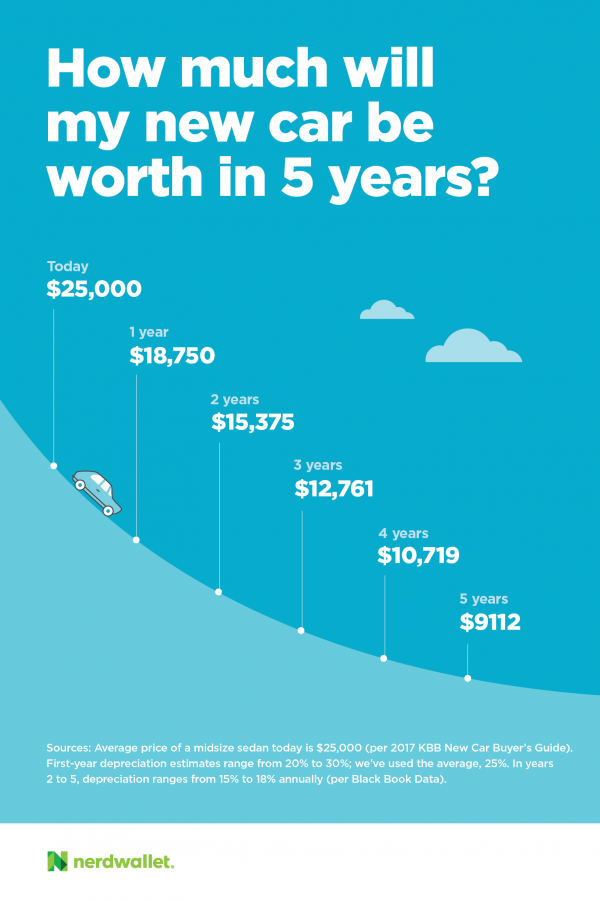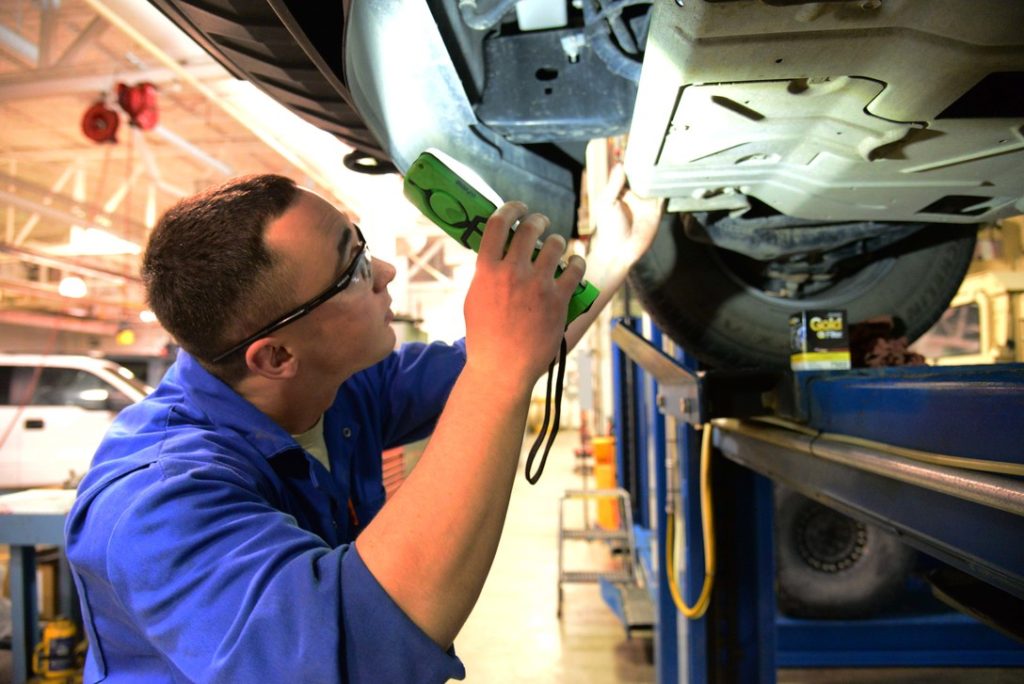Buying your first car is an exciting time! But it can also be a bit overwhelming. You want to make sure you get the best car for the best price, but you’re stepping into a business that has a reputation for taking advantage of inexperienced buyers.
No need to fear! We’ve got you covered. Below, you will find all the information you will need to make your first car-buying experience a happy one.
1. Don’t Buy New
As soon as you drive a new car off the lot, a huge chunk of its value instantly evaporates due to the sinister effects of depreciation. In fact, studies show that most new cars lose around 60% of their value within the first 5 years.
That’s crazy!
This is why I always tell people that the only time someone should be buying new is if you are someone who has reached all of your other major life financial goals:
- Getting through school debt-free or as close to it as possible
- Paying off any school loans you may have acquired
- Paying off all credit card debt
- Fully funding your 6-month emergency fund
- Buying your first home
- Investing 15% of your monthly income towards retirement
- Paying off your home
If you have completed each of these life goals, and you still have money left over, then you are in a position to be able to buy a new car and truly enjoy your purchase.
But since this is an article about buying your first car, I’m going to assume that you do not fit that description. New cars can come later in life. But at this stage, focus on used.
How old should your used car be? Well, that really depends on what your car budget is. If your car budget is $4,000, then you really can’t be too picky about the age of the car or its mileage.
But if cost was not an issue, then the sweet spot for buying a used car would be to buy cars that are between 3-5 years of age. This usually provides the best balance between depreciation and maintenance cost.
The sweet spot for buying a used car would be to buy cars that are between 3-5 years of age.
2. Don’t Assume That a Loan is Required
Countless young consumers have grown up with the assumption that a car bill is just another monthly expense that everyone has in their life – like the power bill, water bill, or rent. But this is not true! Their are many students and young professionals who have bought their cars with cash, and their wallets are thankful that they did!
The biggest reason why going into debt for a car is such a bad idea is because of the depreciation cost that we just talked about above. As much as possible, you want to avoid ever paying interest on depreciating assets. You are already losing money each and every day as it is. Why make matter worse by paying interest? Dave Ramsey explains the situation well in his article on car payments:
The average car payment for a new car is a whopping $545 and interest rates are rising across the entire auto industry with the average interest rate landing at 6.13%.
Then, after explaining how fast new cars depreciate, he goes on to say…
What does that mean? After six years, you’ve paid almost $33,000 for a $26,000 car, which is now maybe worth maybe $6,000. Not a good deal.
Are you seeing the point? Perhaps you are, but you may be wondering how in the world you could buy a car without getting a loan. Here’s a strategy that has worked for many others:
Step 1- Save
Think about how much money you would be spending each month if you went ahead and got that car loan today. Then save that same amount each month for 1 year. For instance, if your future car payment would be $300, then start saving that amount each month. In 1 year, you will have $3,600 saved.
Step 2- Buy With Cash
Next, I want you to buy the best car you can get a hold of for $3,600.
You may be thinking, “Can you even buy a car for $3,600?” Yes! As I discuss more later in this article, the car I’ve been driving for the last 3 years cost me $1,500! Deals are out there. You just have to know where to look (see point #4), be patient, and know that, yes, you’re probably going to get a “clunker.”
Step 3- Keep Saving
Don’t worry! I’m not getting ready to tell you to stay in the $3,600 clunker for 3 years (unless you want to of course!). I only want you to stay in it for 12 months (Yes, go ahead and breathe that sigh of relief). And guess what you’re going to be doing during that time?
Still saving $300 a month.
Step 4- Sell and Upgrade
In 12 months, you should be able to sell your clunker for almost the full $3,600 you bought it for a year ago. Annual depreciation crawls to almost zero with cars that are 10 years old or more. Add that to the $3,600 that you’ve saved over the past 12 months and now all of the sudden you can afford a $7,200 car.
Step 5- Rinse and Repeat
You can repeat this process as many times as you want until you have the car that you want. The point is that when you ask most people if they can save money to buy a car with cash, they’ll say “No Way!” But remember: those SAME people who will end up finding room in their budgets to make their car payments.
You ARE going to find the money to pay for your car one way another. The only question is whether or not you will end up throwing extra money down the toilet in interest.
That being said, if you do absolutely have to get a car loan, then make sure to pre-arrange your financing with your local bank or credit union. Dealer loans are usually far more expensive. And do not get a lease.
3. Keep Insurance In Mind
Car insurance companies don’t like young drivers – especially teens. But when you take a look at some of the stats for teen driving, it’s hard to blame them. The risk of crash per mile driven is three times higher for 16-19-year-olds than for drivers age 65-69, and auto accidents are the leading cause of death for teens age 15-20.
Insurance companies are all about the numbers, so, unfortunately, there’s no way around the fact that a 17 or 21-year old’s insurance cost is going to be higher than a 27 or 31-year old’s insurance cost would be (as long as their driving records are similar).
Related: How to Save On Car Insurance Under Age 25
Car Type Matters
There are ways to save on car insurance though. Insurance cost can vary widely depending on the type of car that you buy. Buying used instead of new typically will save you on your insurance (another benefit of used cars).
Another way to save is to stay away from sports cars, which insurers typically penalize with higher rates. If you want to know which cars on the market today are the absolute cheapest to insure, check out this list from The Balance.
For more ways to save on auto insurance, especially for young drivers, check out our full car insurance guide.
4. Wait for the Sizzlin’ Deal
If you want to find a great deal, don’t start with your local car dealership. You’re going to have to be more creative than that. Below, are three ways to find that amazing deal that you’re hoping for.
Deal Sites
Here are some great sites where you can find really great deals on used cars: Craigslist, AutoTrader, iSeeCars, the Klipnik message boards and CarGurus.
Friend in the Car Business
If you happen to have a trusted friend or family member who works at a car dealership, you could ask them keep an eye out for you for a car that would be a good deal in your price range.
This is exactly what my brother did a few years ago to buy his first car when he was still in high school. My family had a long-time friend who worked at a dealership. My brother told him what kind of car he was looking for and his price range. It took several months before the right deal came along, but when it did, our friend gave us a call, and my brother was able to get a very nice 2002 Chrysler 300M for $3,500.
Trusted Mechanic
I have used the same car mechanic for many years, and thankfully can say that I fully trust him. The last time I was in the market for a car, I had him keep an eye out for me. He knew my price range, and he would shoot me a text whenever he would come across a car for sale by one of his other clients that was a good deal.
Soon, he texted me about a Ford Taurus with 87,000 miles on it, being sold for only $1,500. One of his clients had died and the son was in town from up north trying to quickly sell off things from the estate. Since my mechanic had done all the maintenance on the car up to that point, he could confidently tell me that the car was in good shape and had no major repairs coming in the near future
Needless to say, I jumped at the deal! And nearly 3 years later, I haven’t had one major repair to the car. I still can’t believe I bought that car for $1,500. You can’t buy some lawn mowers for that cheap!
If you or your family have a trusted mechanic of your own, this may be another way to help you find a sizzlin’ deal.
5. Pick the Best Time to Buy
If you ARE going to buy your car from a dealership, then the time of year that you buy matters. According to Autotrader, here are the best times to buy a car:
- The end of the month
- Holiday weekend sales
- The end of each quarter (March, June, September, and December).
December is not only the end of a quarter, but it’s also the end of the year, which is when dealerships are trying to reach their annual goals. This gives them an even greater incentive to cut prices and make deals. For these reasons, I do think the end of the year is the most ideal time to buy.
The next best time to buy would be at the end of the summer or early fall because this is when most new models are arriving at the dealerships. Dealerships will often slash prices to make room for the new inventory.
6. Know the Car’s Actual Value
It should go without saying, but you need to know what the car you’re considering is actually worth. How else can you determine if you the price you’re being offered is fair? Kelley Blue Book and Edmunds are two of the most popular places to check car values, although many other sites like Auto Trader, Cars.com, and Car Gurus offer similar services.
7. Check Consumer Reports for Reliability
We’ve all heard of buying cars that are “lemons.” But what about entire car models that are lemons?
It may not be something that you’ve thought about before, but there are certain car lines that are known as cars that you can drive “until the wheels off,” and others that have a reputation for spending more time in the repair shop than in your driveway.
This is where Consumer Reports comes in so handy. They test nearly every automobile on the road and give each car a reliability rating. Checking the reliability rating is especially crucial when you are buying a used car.
To check the reliability of the car you are considering, check out their car research page. You may also want to check out their 10 most reliable cars and 10 least reliable cars lists.
8. Look Up the Car’s VIN Number
So, you’ve looked up the car model that you’re interested in and you’re pleased to see that it has a favorable reliability rating.
But what about your specific car? A car’s past could have a lot to do with its future reliability.
Consider this: if the car you are thinking about buying had been in a major accident, salvaged, or sustained flood damage, would you want to know? I bet you would. And with a free VIN number check, you can.
If you buy your car from a dealership, they will often give you a free Carfax report, which is the most commonly used VIN number database and reporting system. However, if you buy your car from Craigslist or Ebay, you will have to look up your car’s VIN number on your own.
There are several different sites that offer free VIN check services. Check out Clark Howard’s guide to VIN number checks to see how much information each site can give provide.
9. Take a Test Drive
- Is there anything that feels off about the way the car drives?
- Do you notice any “bucking” when the car is at idle?
- Does it accelerate smoothly?
- Do you notice any significant pulling to the left or right?
- Do the brakes seem responsive?
These are just some of the questions that you can’t get answered if you don’t hop behind the wheel and give the car a spin.
NEVER buy a car online where the seller lives in a different state and promises to ship the car to you after the sale.
First of all, these deals (usually found on Craigslist) are nearly always scams. And, second of all, you should never buy a car that you won’t get to test drive before you pay.
10. Schedule an Independent Mechanic Inspection
If you are buying a car from an individual, and he or she is against the idea of you having an inspection done on their car, run the other way!
Even if you are buying your car from a dealership, you shouldn’t rely on the dealer mechanic’s blessing. There is a definite conflict of interest there. You need to bring in your own mechanic to look the car over.
Using a trusted mechanic that you already have a relationship with would be ideal. But if you don’t have that luxury, then check out AIM Certify or Automobile Inspections to find a certified inspector in your area.
11. Choose Your Negotiation Strategy
Car-buying negotiations have been notorious through the years for being difficult and tiring. But fortunately, there are more options today than have ever been available in the past to make your negotiation process as painless as possible. I would recommend that you choose one of the three options below.
Instant Quotes
There are many websites now that will give you instant price quotes…no haggling required! TrueCar, CarsDirect, Overstock, and USAA are a few of the popular retailers. Even Costco has gotten in on the action and offers competitive online car prices.
Phone or Email
Start by finding the car’s online price. Then give the dealership a call or send an email to their online department to see if they will match the web price.
Bring Along Someone You Trust
Even with all of the online options available today, many people still feel that you can’t get the absolute best deal on a car unless you go in-person to a dealership and negotiate with a real human being.
If this is how you feel, I would recommend that you bring along a trusted family member or friend with experience buying cars who can help you throughout the negotiation process. Some unscrupulous dealership employees can smell a big, fat, easy profit when they see a young buyer walking in the door.
Having someone else with you to listen and offer support can help you avoid being taken advantage of.
12. Avoid “Extras” and “Junk Fees”
If you are buying your car from a dealership, you need to understand that they make a great deal of their money from “upselling” customers on things like feature upgrades or extended warranties. Some will also try to throw in “junk fees” to put a little more cash in their own pocket.
Upgrades
The “upgrades” like special car detailing, window tinting, splash guards, and pinstripes may sound good at the moment, but most are unnecessary and can quickly cause you to blow your budget.
Extended Warranties
This article from CarFax explains why I would never recommend buying an extended warranty on a new car.
If you are buying used, Consumer Reports found that there are times that they can be beneficial, but I still would prefer that you just have an emergency car repair fund set aside instead.
Junk Fees
Make sure to keep an eye out for keywords like fee, charge, surcharge or the mention of activation and delivery fees when looking over your paperwork and contracts.
Many customers walk away from their car purchase feeling like they paid too much, and these “junk fees” are usually a major reason why. They could end up costing you an extra $1,000-$2,000!
When you see these words, ask the salesperson if they will waive these items. If they say they cannot, then ask for the manager. And, if or she refuses as well, you may have to walk away from the deal.
Conclusion:
There’s no doubt that with a little effort, you can save a ton of money on your first car purchase. But you’re unlikely to enjoy any savings whatsoever if you just haphazardly wake up on a Saturday morning and decide to go car shopping.
Getting a sizzling deal as a first-time car buyer takes a lot of time, research, and patience. So buckle your seat belt and prepare to give your car shopping process the time and effort that it requires.






So buckle your seat belt and prepare to give your car shopping process the time and effort that it requires.